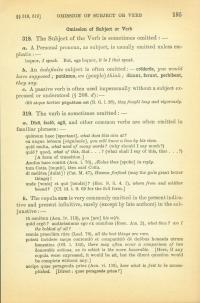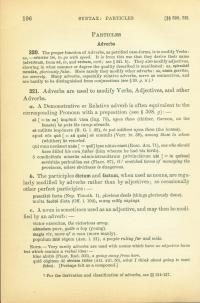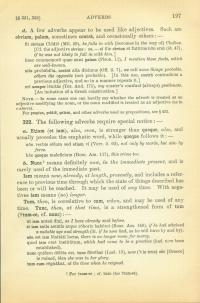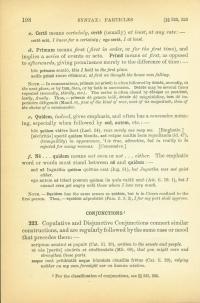320. The proper function of adverbs, as petrified case forms, is to modify verbs.
celeriter īre
to go with speed
It is from this use that they derive their name [adverbium, from ad (to), and verbum (verb); see § 241.b). They also modify adjectives, showing in what manner or degree the quality described is manifested.
splendidē mendāx
gloriously false
More rarely they modify other adverbs.
nimis graviter
too severely
Many adverbs, especially relative adverbs, serve as connectives, and are hardly to be distinguished from conjunctions (see § 20.g, Note).1
321. Adverbs are used to modify verbs, adjectives, and other adverbs.
a. A Demonstrative or Relative adverb is often equivalent to the corresponding pronoun with a preposition (see § 308.g).
Eō [= in ea] impōnit vāsa. (Iug. 75)
Upon them (thither, thereon, on the beasts) he puts the camp utensils.
eō mīlitēs impōnere (B. G. 1.42)
to put soldiers upon them (the horses)
apud eōs quō [= ad quōs] sē contulit (Verr. 4.38)
among those to whom (whither) he resorted
quī eum necāsset unde [= quō] ipse nātus esset (Rosc. Am. 71)
one who should have killed his own father (him whence he had his birth)
Ō condiciōnēs miserās administrandārum prōvinciārum ubi [= in quibus] sevēritās perīculōsa est. (Flacc. 87)
O! wretched terms of managing the provinces, where strictness is dangerous.
b. The participles dictum and factum (and occasionally other perfect participles), when used as nouns, are regularly modified by adverbs rather than by adjectives.
praeclārē facta (Nep. Timoth. 1)
glorious deeds (things gloriously done)
multa facētē dicta (Off. 1.104)
many witty sayings
c. A noun is sometimes used as an adjective, and may then be modified by an adverb.
victor exercitus
the victorious army
admodum puer
quite a boy (young)
magis vir
more of a man (more manly)
populum lātē rēgem (Aen. 1.21)
a people ruling far and wide
Note— Very rarely adverbs are used with nouns which have no adjective force but which contain a verbal idea.
hinc abitiō (Plaut. Rud. 503)
a going away from here
quid cōgitem dē obviarr itiōne (Att. 13.50)
what I think about going to meet (him)
[Perhaps felt as a compound.]
d. A few adverbs appear to be used like adjectives. Such are obviam, palam, sometimes contrā, and occasionally others.
Fit obviam Clōdiō (Mil. 29)
He falls in with (becomes in the way of) Clodius.
[Cf. the adjective obvius: sī ille obvius eī futūrus nōn erat (id. 47)
if he was not likely to fall in with him]
Haec commemorō quae sunt palam. (Pison. 11)
I mention these facts, which are well-known.
Alia probābilia, contrā alia dīcimus (Off. 2.7)
We call some things probable, others the opposite (not probable).
[In this use, contrā contradicts a previous adjective, and so in a manner repeats it.]
erī semper lēnitās (Ter. And. 175)
my master's constant (always) gentleness
[An imitation of a Greek construction.]
Note— In some cases one can hardly say whether the adverb is treated as an adjective modifying the noun, or the noun modified is treated as an adjective (as in c above).
For propius, prīdiē, palam, and other adverbs used as prepositions, see § 432.
322. The following adverbs require special notice.
a. Etiam (et iam; also, even) is stronger than quoque (also) and usually precedes the emphatic word, while quoque follows it.
nōn verbīs sōlum sed etiam vī (Verr. 2.64)
not only by words, but also by force
hōc quoque maleficium (Rosc. Am. 117)
this crime too
b. Nunc2 means definitely now, in the immediate present, and is rarely used of the immediate past. Iam means now, already, at length, presently, and includes a reference to previous time through which the state of things described has been or will be reached. It may be used of any time. With negatives iam means (no) longer. Tum (then) is correlative to cum (when) and may be used of any time. Tunc (then, at that time) is a strengthened form of tum (†tum-ce, cf. nunc).
ut iam anteā dīxī
as I have already said before
sī iam satis aetātis atque rōboris habēret (Rosc. Am. 149)
if he had attained a suitable age and strength
(lit. if he now had, as he will have by and by)
nōn est iam lēnitātī locus
there is no longer room for mercy
quod iam erat īnstitūtum
which had come to be a practice (had now been established)
Nunc quidem dēlēta est, tunc flōrēbat. (Lael. 13)
Now (it's true) she [Greece] is ruined, then she was in her glory.
tum cum rēgnābat
at the time when he reigned
c. Certō means certainly, certē (usually) at least, at any rate.
Certō sciō
I know for a certainty.
ego certē
I at least
d. Prīmum means first (first in order, or for the first time), and implies a series of events or acts. Prīmō means at first, as opposed to afterwards, giving prominence merely to the difference of time.
hōc prīmum sentiō
this I hold in the first place
Aedīs prīmō ruere rēbāmur
At first, we thought the house was falling.
Note— In enumerations, prīmum [or prīmō] is often followed by deinde (secondly, in the next place), or by tum (then), or by both in succession. Deinde may be several times repeated (secondly, thirdly, etc.). The series is often closed by dēnique or postrēmō (lastly, finally).
prīmum dē genere bellī, deinde dē māgnitūdine, tum dē imperātōre dēligendō (Manil. 6)
first of the kind of war, next of its magnitude, then of the choice of a commander
e. Quidem (indeed) gives emphasis, and often has a concessive meaning, especially when followed by sed, autem, etc.
Hōc quidem vidēre licet. (Lael. 54)
This, surely, one may see. [Emphatic]
[Sēcūritās] speciē quidem blanda, sed reāpse multīs locīs repudianda. (id. 47)
(Tranquillity) attractive in appearance, it's true, but in reality to be rejected for many reasons. [Concessive]
f. Nē . . . quidem means not even or not ... either. The emphatic word or words must stand between nē and quidem.
Sed nē Iugurtha quidem quiētus erat. (Iug. 51)
But, Jugurtha was not quiet either.
Ego autem nē īrāscī possum quidem iīs quōs valdē amō. (Att. 2.19.1)
But I cannot even get angry with those whom I love very much.
Note— Equidem has the same senses as quidem, but is in Cicero confined to the 1st person.
Equidem adprobābō (Fam. 2.3.2)
I for my part shall approve.




